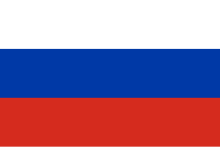Russia at the 2016 Summer Paralympics
| Russia at the 2016 Summer Paralympics |
|||||||||
|---|---|---|---|---|---|---|---|---|---|
 |
|||||||||
| IPC code | RUS | ||||||||
| NPC | Russian Paralympic Committee | ||||||||
| Website |
www |
||||||||
| in Rio de Janeiro | |||||||||
| Competitors | 0 in 0 sports | ||||||||
| Medals |
|
||||||||
| Summer Paralympics appearances | |||||||||
| Other related appearances | |||||||||
|
|
|||||||||
Russia was originally scheduled to compete during the 2016 Summer Paralympics in Rio de Janeiro, Brazil, in what would have been its sixth consecutive appearance at the Summer Paralympics as an independent nation. Russia had qualified athletes in ten sports.
On 7 August 2016, the International Paralympic Committee announced that it had voted unanimously to ban the entire Russian Paralympic team from competing in the 2016 Summer Paralympics, in the wake of a larger scandal that exposed the participation of Russian Olympic and Paralympic athletes in a state-sponsored doping program. The Russian Paralympic Committee appealed to the Court of Arbitration for Sport (CAS) and the Federal Supreme Court of Switzerland, but both bodies upheld the IPC's decision. IPC president Philip Craven stated that Russia's actions had demonstrated a failure in its obligations to comply with established anti-doping protocols.
The decision to ban the entire Russian team contrasts the treatment of the Russian Olympic team during the 2016 Summer Olympics, whose members could compete if they had independent certification that they had not used drugs, and were cleared by their sport's respective governing body and an International Olympic Committee panel. The IPC's differing stance was criticized by President Vladimir Putin and other Russian politicians, who felt that the IPC was violating the human rights of Russian Paralympic athletes by not giving them the same privilege to individually appeal for participation in the Games as their Olympic counterparts. Russia organized an alternative, national event for its Paralympic athletes, promising rewards similar to what they would have earned had they won medals in Rio.
Every participant at the Paralympics has their disability grouped into one of five disability categories; amputation, the condition may be congenital or sustained through injury or illness; cerebral palsy; wheelchair athletes, there is often overlap between this and other categories; visual impairment, including blindness; Les autres, any physical disability that does not fall strictly under one of the other categories, for example dwarfism or multiple sclerosis. Each Paralympic sport then has its own classifications, dependent upon the specific physical demands of competition. Events are given a code, made of numbers and letters, describing the type of event and classification of the athletes competing. Some sports, such as athletics, divide athletes by both the category and severity of their disabilities, other sports, for example swimming, group competitors from different categories together, the only separation being based on the severity of the disability.
...
Wikipedia
